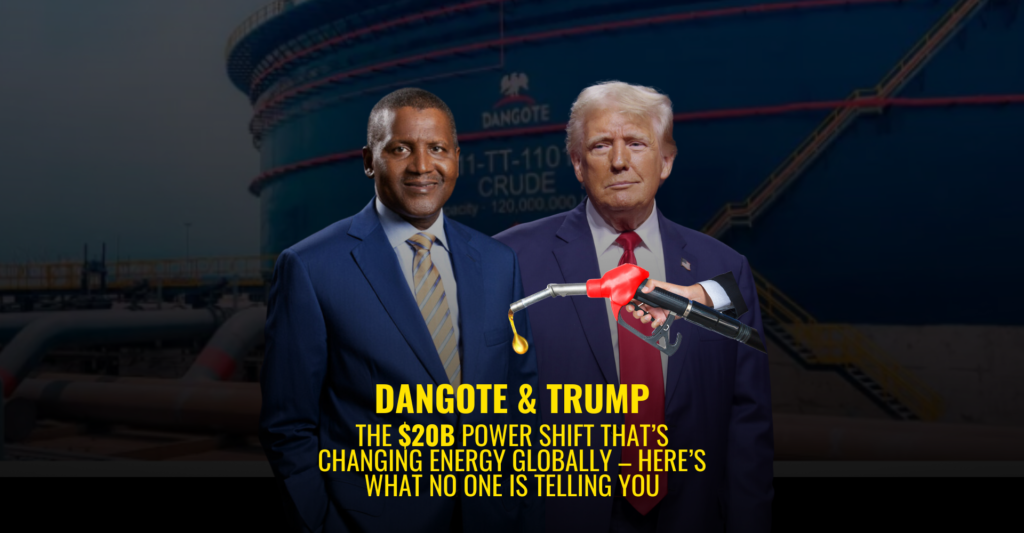The $20B Power Shift That’s Changing Energy GLOBALLY – Here’s What No One Is Telling You

You’ve Seen This Before...
In business, energy, and tech, the builders shape the future.
In The Matrix, Neo had a choice:
1. Blue pill – Stay trapped in the system, playing by someone else’s rules.
2. Red pill – Wake up, see who really has the power.
Your choice: Will you keep playing inside someone else’s system or start building your own?
Imagine if Jeff Bezos had built Amazon AND all the shipping companies that deliver his products.
Meet the Man Changing Africa
That’s what our brother Aliko Dangote is doing in Africa. He’s Africa’s richest man with a net worth of $10.8 billion.
He started in cement, then expanded into food, manufacturing, and now, oil and energy.
Instead of just selling raw materials, he builds the factories, refineries, and supply chains that process them.
Now, he’s recently made his biggest move yet: a $20 billion oil refinery that will change Nigeria’s future.
Why this matters to you: The people who OWN the process make the money. If you just sell raw skills, ideas, or products, you’ll always pay someone else to refine them.
Nigeria’s Power Move

Africa has massive oil reserves. Yet, for decades, it’s been selling raw materials and buying back finished products at high prices.
Now? That cycle is breaking.
The U.S. is cutting Nigerian oil imports while Trump’s administration pushes “America First” energy policies, tariffs, drilling, and more local production.
That could be bad news. Except Dangote saw it coming.
He built Africa’s biggest refinery (650,000 barrels/day).
The future belongs to builders.
Why this matters to you: The world is shifting. The U.S. is securing its future. Nigeria is securing its future. At Unified State Group we are securing our future. Are you securing yours? Or are you waiting for someone else to decide it for you?
Bring Order to Chaos
The U.S. wants to control oil prices. That might push Nigeria closer to China and other rising powers.
If the U.S. steps back, others step in. Who really wins?
This isn’t just about oil. It’s about freedom, strength, and a future you own.
Why this matters to you: If you don’t claim your spot, someone else will. The same is true in business, wealth, and influence.
This is the Playbook:
– Rockefeller controlled oil AND railroads.
– Bezos didn’t just sell online, he built the system.
– Dangote isn’t just refining oil, he’s changing Africa’s future.
The biggest wins don’t go to those who follow the rules. They go to those who build the new system.
But no one builds alone. The fastest way to create new systems is to UNIFY with others who share your vision and values.
Why this matters to you: The biggest opportunities aren’t given, they’re created. The question is: Will you build or will you wait?
God’s creation is inherently valuable. Everything created serves a purpose, contributing to the greater good of the system. Entrepreneurs evolve by focusing on how they can create value for their customers, employees, and communities. The more value you create, the more you’ll grow.
Actionable Tip: Constantly ask, “How can I serve others better?” Value creation is not just about profit but about making life easier, solving problems, and meeting needs.
Creation didn’t stop with the first steps; it’s an ongoing process. God’s creation is dynamic, constantly evolving. As entrepreneurs, we must view challenges and failures as feedback that helps us refine and grow. Every setback is an opportunity to learn and improve.
Netflix’s pivot from DVD rentals to streaming services is a prime example of embracing feedback and adapting. By recognizing changing consumer needs, they transformed their business model and became a global entertainment giant.
Actionable Tip: Treat failures as stepping stones. Seek feedback from customers, mentors, and team members, and use it to adjust and improve your approach.
Isaac's Closing Questions
- Nigeria is making power moves. Do you think the west will embrace this shift, or fight it?
- Are you playing inside the system—or building the next one?

